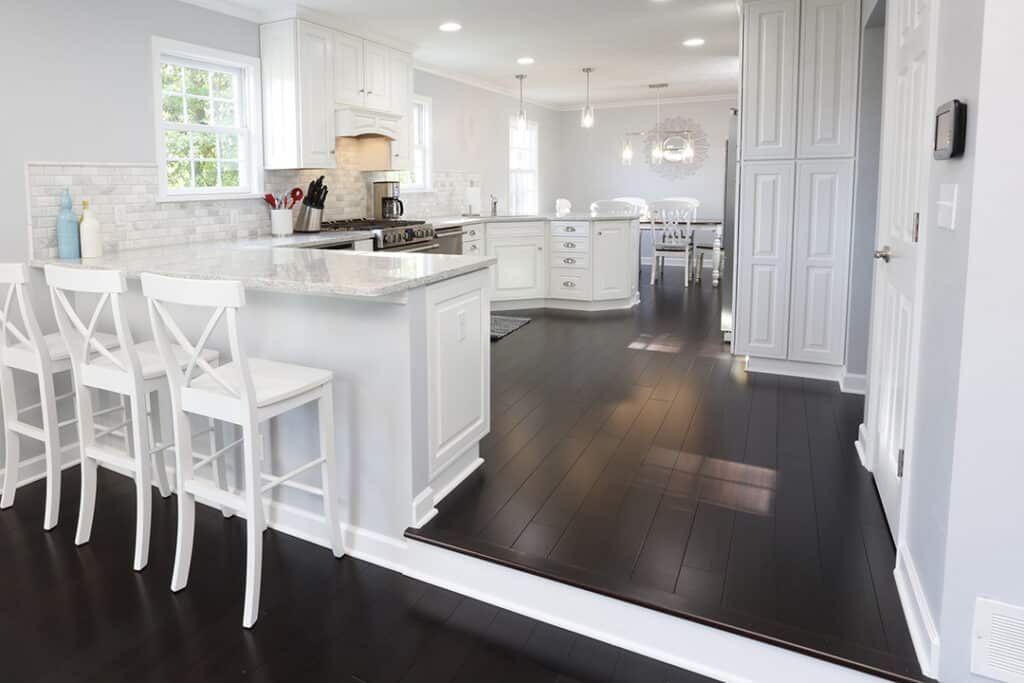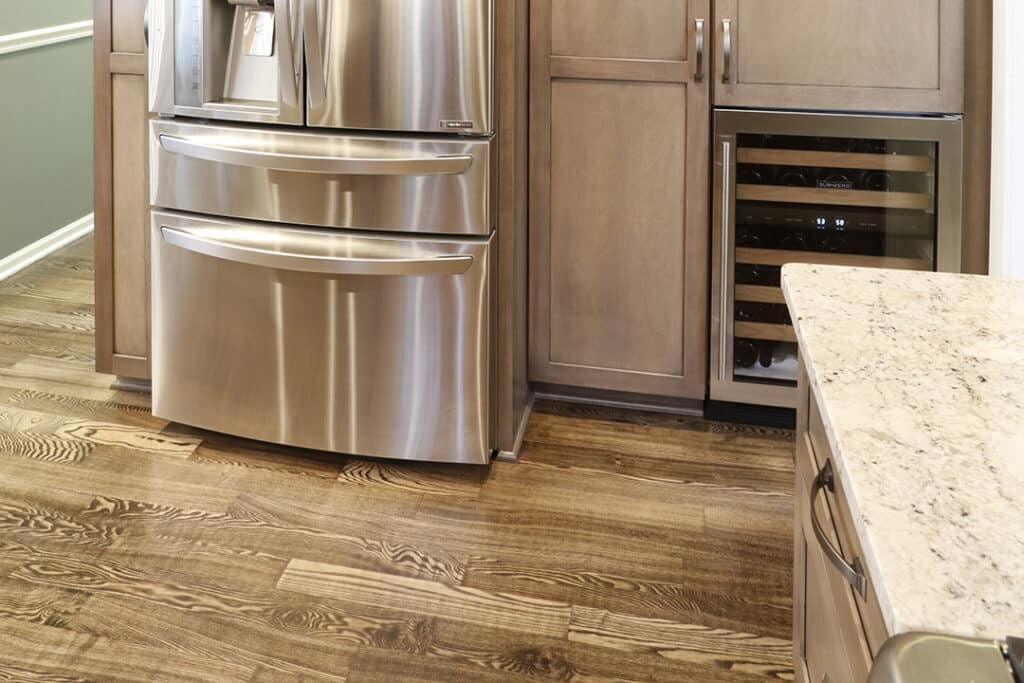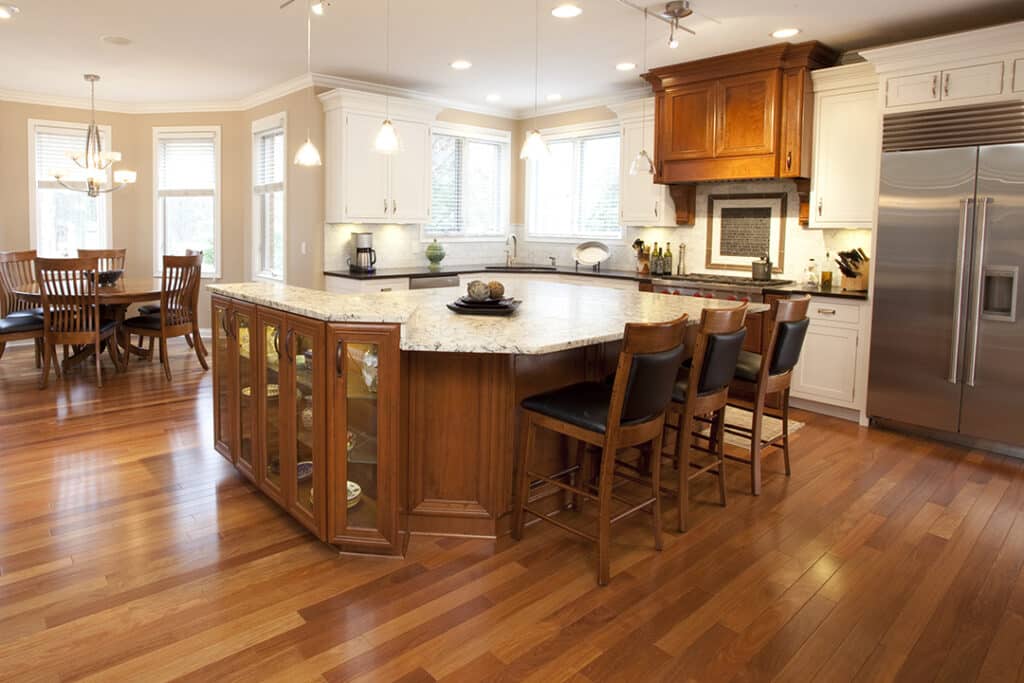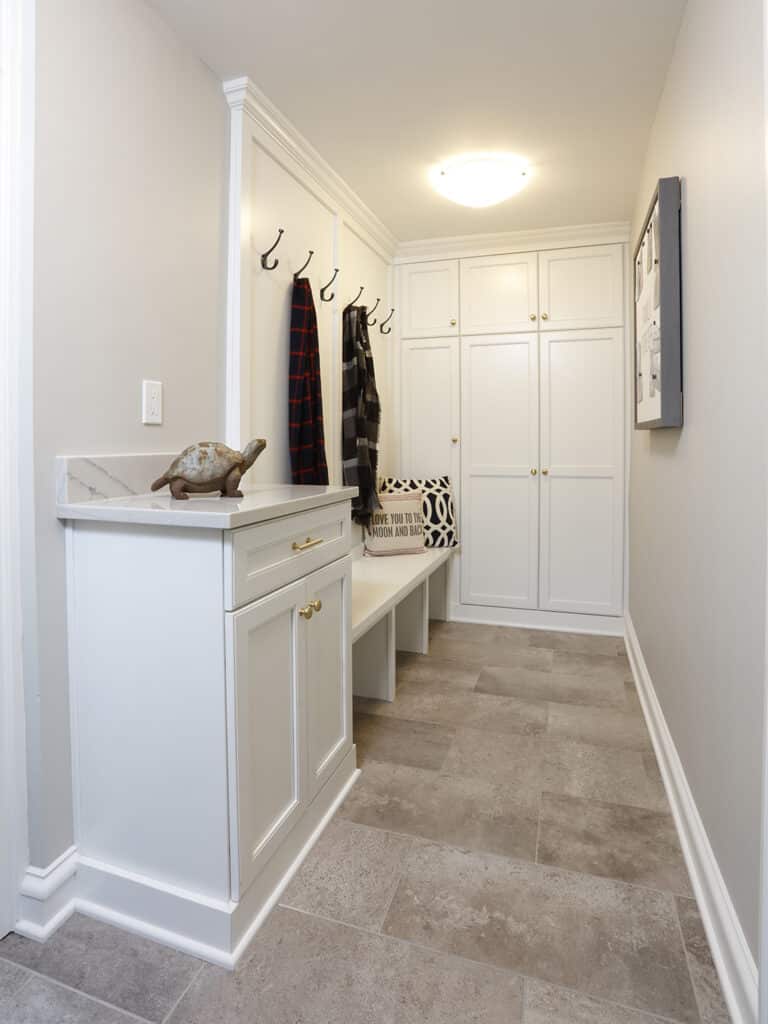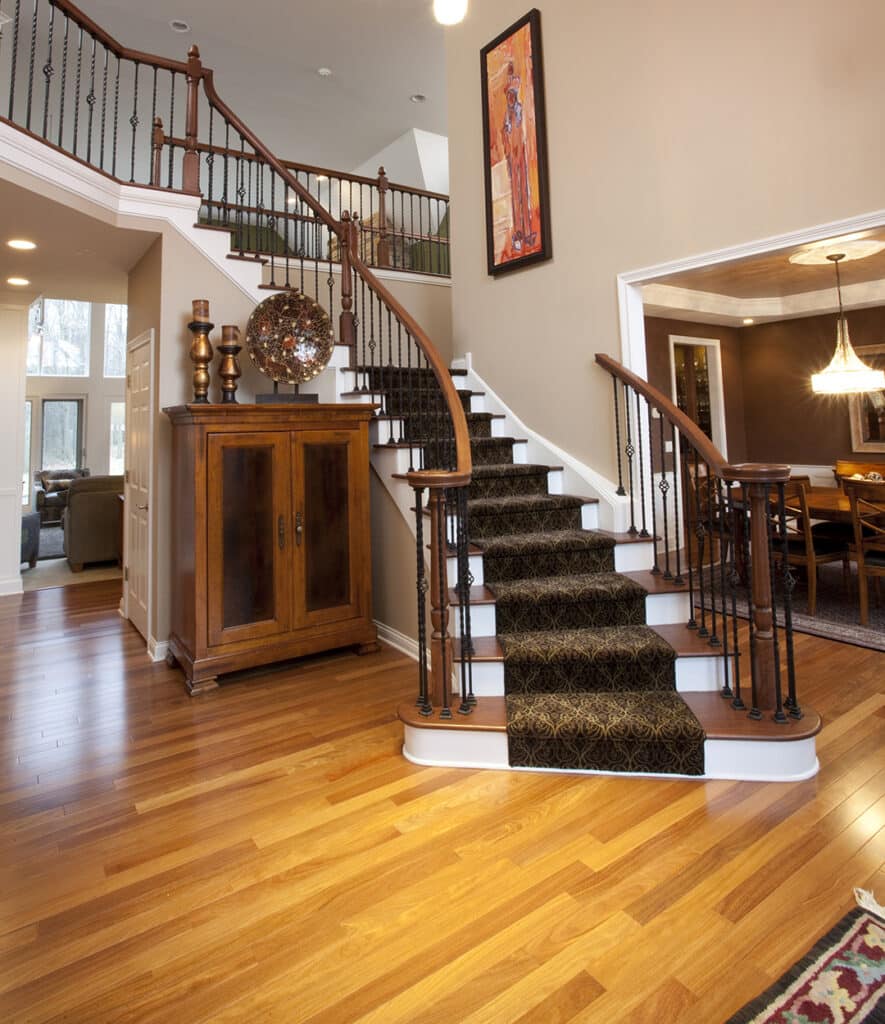Flooring is one of the most significant upgrades you can make to your home that has the potential to considerably increase your home’s resale value. Upgrading your flooring can make a big difference in the fit and finish of your home. And since quality flooring holds its value for the life of your home, consider making the upgrade while you can enjoy it.
So, is there a return on investment to installing hardwood flooring? According to a report by the National Association of Realtors (NAR), homeowners recover 106% of the cost of installing new hardwood flooring when selling their homes, and 147% of the cost of refinishing existing hardwood flooring. Source: National Association of Realtors (NAR) 2022 Remodeling Impact Report.
How Much Can a New Floor Increase Your Home Value?
Universally, installing new flooring will increase the value of your home. Quality flooring is one of the top requirements for home buyers, and so it drives up the price of your home. This is especially true in neighborhoods where your flooring can be a unique selling proposition.
There are several options for new flooring, but leading the pack among all flooring product options, hardwood floors boast exceptional ROI and boost home resale values by as much as 2.5% (Source: Realtor.com).
But not all hardwood upgrades are equal. Your return on investment varies depending on the price of your home, your neighborhood or zip code, the type of flooring you choose and the condition of your floor.
What Factors Contribute to the Resale Value of My New Floors?
To get the greatest value out of any home improvement project, you want to be sure the upfront costs don’t outweigh the potential gain. Beyond material and labor costs, there are many variables to keep in mind when determining the potential increase in your home’s resale value based on a new flooring investment. Consider these factors as you estimate the ROI in upgrading the flooring in your home.
The condition of the floor you are replacing.
You only get one chance to make a first impression. And your floors play a major role in how potential buyers view your home. Outdated, worn carpet, chipped tile, stained grout—these flooring flaws are hard to overlook and can be a non-starter for potential buyers. If your home flooring needs a refresh, investing in new floors is essential to help showcase your home in its best light.
What type of new flooring do you plan to install?
Generally, home flooring installations follow this universal truth: you get what you pay for. So, it follows that value-grade materials will yield a value-grade result. Conversely, using high-end products and finishes with professional installation will create a quality finish with a high-end effect. Materials, decorative patterns and specialty finishes all play a role in the overall impact of your flooring installation, so make your selections accordingly.
Which areas of your home do you plan to upgrade?
Quality flooring is a win in any part of the home, but new homebuyers particularly notice upgraded floors in open living areas and kitchens. As these living spaces are the main gathering areas in most homes, you want to choose flooring that’s not only attractive but is also durable, easy to maintain and comfortable underfoot.
The price of your house and where you live.
Demographics play a role in the expectations potential buyers have for home finishes. Generally, any new floor will increase the value of an entry-level home. Replacing builder-grade materials with upgraded flooring is a simple way to elevate the home aesthetically while adding value, making it more appealing to buyers.
Luxury homes have a bigger potential for returns on upgraded flooring but require higher quality, longer-lasting materials. Buyers shopping high-dollar real estate expect a certain level of quality in flooring and other home materials. To make your property more appealing in this market segment, stand out with premium craftmanship. Consider upgrading your high-end flooring installations with patterns, inlays and other custom appointments. To learn more about elevating your hardwood floors, check out our blog about custom hardwood installations.
What Flooring Adds the Most Value to a Home?
Hardwood gives you a lot of bang for your buck, but it’s not the only option.
Hardwood Offers Best ROI
The chameleon of flooring, hardwood has a timeless profile that works well with every home design style from contemporary to traditional. With so many product options available, you can find a hardwood that meets your expectations for style, durability, maintenance and performance. Plus, it’s a flooring option that pays you back: Hardwood flooring has the best return on investment compared to other materials.
According to research by USA Today, 54% of home buyers were willing to pay more for a home with hardwood flooring.
Know Your Options: Types of Hardwood
According to House Beautiful, the most popular flooring in 2022 is mid- to dark-brown wood floors. In second place is oversized wide-plank wood flooring that creates a clean, seamless look. And both are available in a wide variety of different wood types, tones and product profiles.
Engineered hardwood has a similar ROI to traditional hardwood floors. If you’re considering installing hardwood flooring, read our blog that details everything you need to know to find the right product for your home application.
Hardwood prices vary by type of wood.
Second Best ROI: Tile
Ceramic tile has the second-best return on investment at 70%. Some of the most popular home trends in 2022 include mosaic, art-deco patterns and wood-look plank tile. While porcelain tile certainly increases home resale value, the cost of these tiles is more expensive than laminate or luxury vinyl flooring.
Natural stone and marble tiles are luxurious, but many home buyers are concerned about the required maintenance. With today’s trend toward easy-care flooring and the high material costs, the ROI on these luxe tile installations is relatively low.
To find the right tile option for your home, check out this blog about choosing the right tile for your home.
Vinyl or Laminate Floors
While vinyl and laminate flooring may be a practical choice for your lifestyle—think pets, kids and heavy foot traffic—these products don’t add much to the resale value of your home. Where traditional peel-and-stick vinyl or linoleum products aren’t attractive these days, luxury vinyl flooring (LVF) and vinyl composite tile (VCT) can provide a return on homes in a certain price bracket.
Carpet
New carpet can increase your home’s resale value, primarily when used as a sensible upgrade to existing flooring in bedrooms and other areas in the home where buyers are looking for comfort, warmth and sound-dampening qualities.
Be mindful that existing carpeting can concern new home buyers. Older carpets are often perceived as dirty and dusty and aren’t as attractive to buyers. However, replacing older carpets with hardwood or tile can lead to a significant increase in the value of your home.
A final word about choosing the right flooring for your home remodel
Sometimes the best return you can get on money spent is the time you have to enjoy it. If you install quality materials like hardwood or tile, these investments will last a long time. So, don’t wait to install them as you prepare to sell your home. Instead, install them today and enjoy living with them in your home.
If you live in Northeast Ohio, visit us at the Dover Floor & Tile Center in North Olmsted.
We not only have a wide selection of all types of flooring. But we’ve got experts available to help you make an informed decision about the best flooring products for your home application and professional installation teams to create the beautiful, finished product.
The best is yet to come,
Beth Orr
